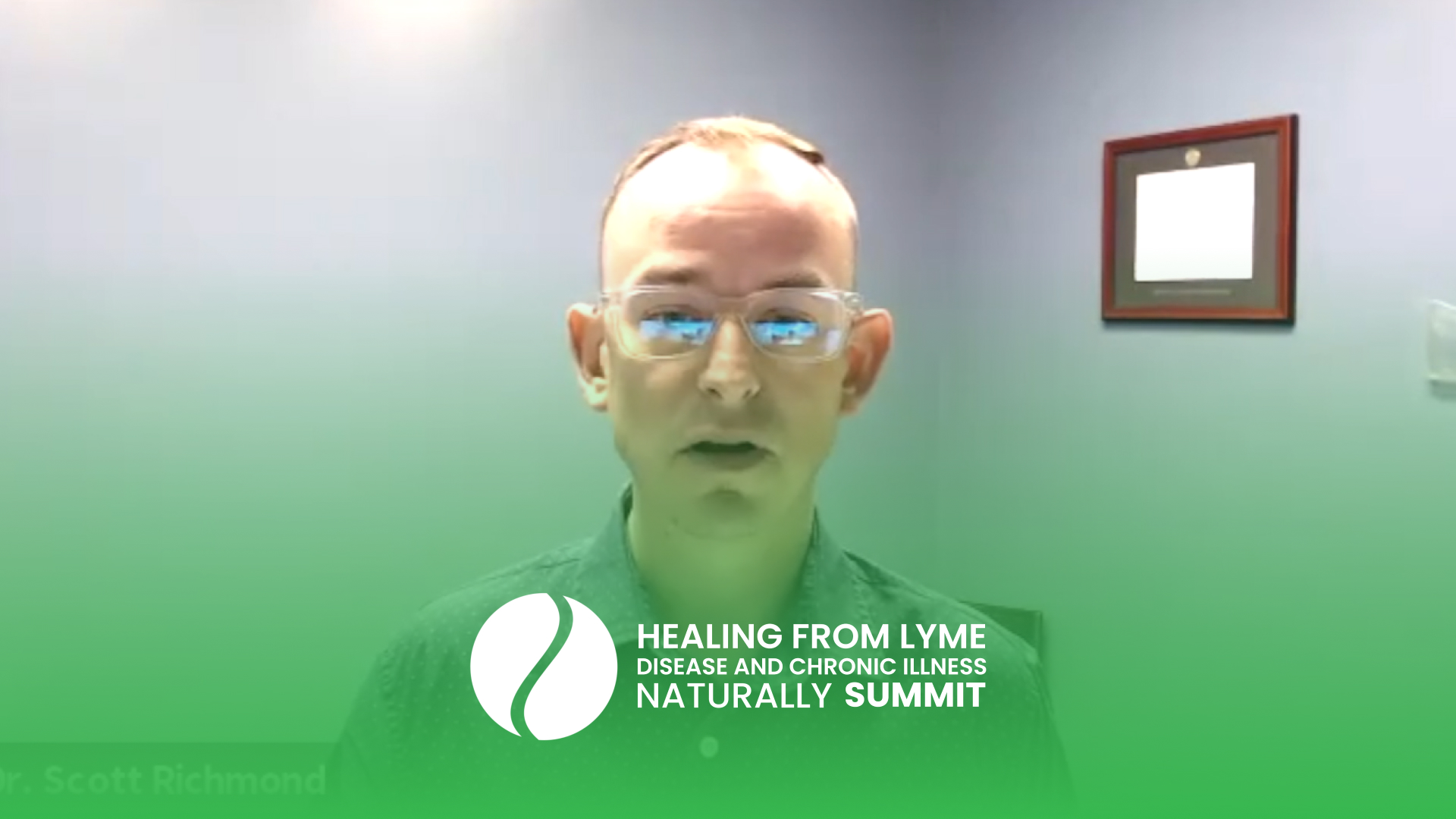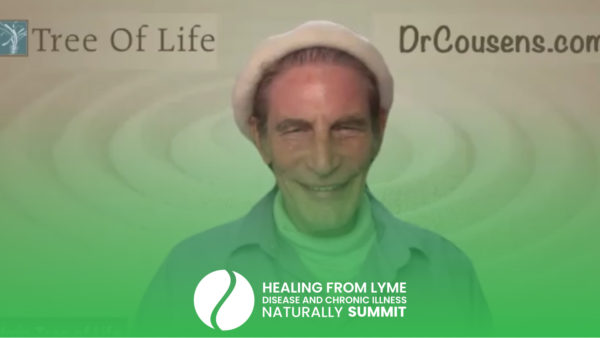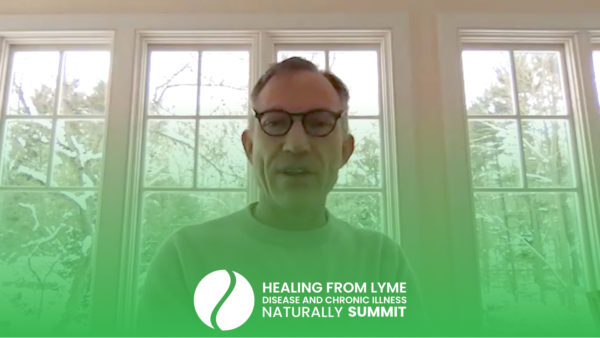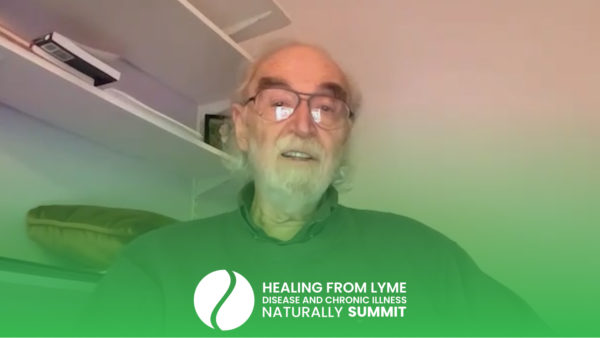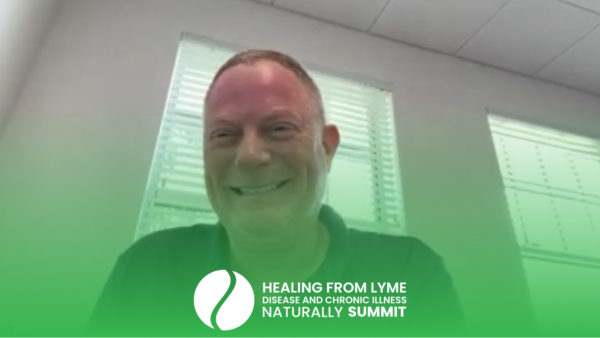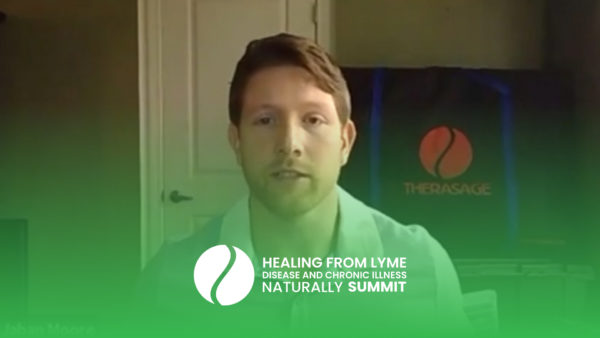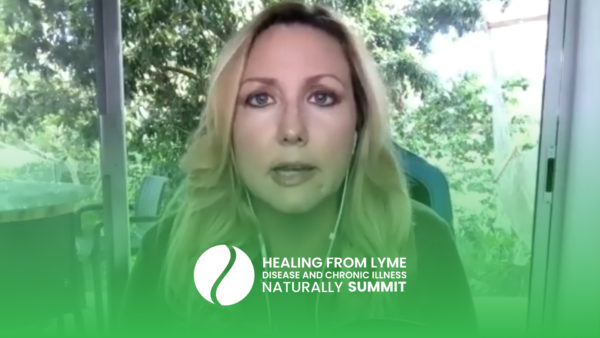Join the discussion below
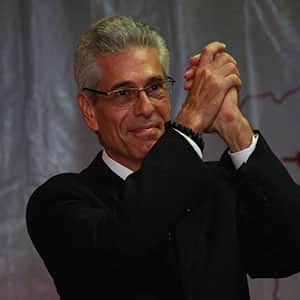
Rob Besner, PSc.D, Co-Founder and Chief Science Officer of Therasage, has always been an advocate of natural health and wellness. Graduating from Boston University in Pre-Med, Engineering, Psychology and Business, he continued onto post graduate work at Case Western Medical School and Holistic Medicine After many years of illness, Mr.... Read More
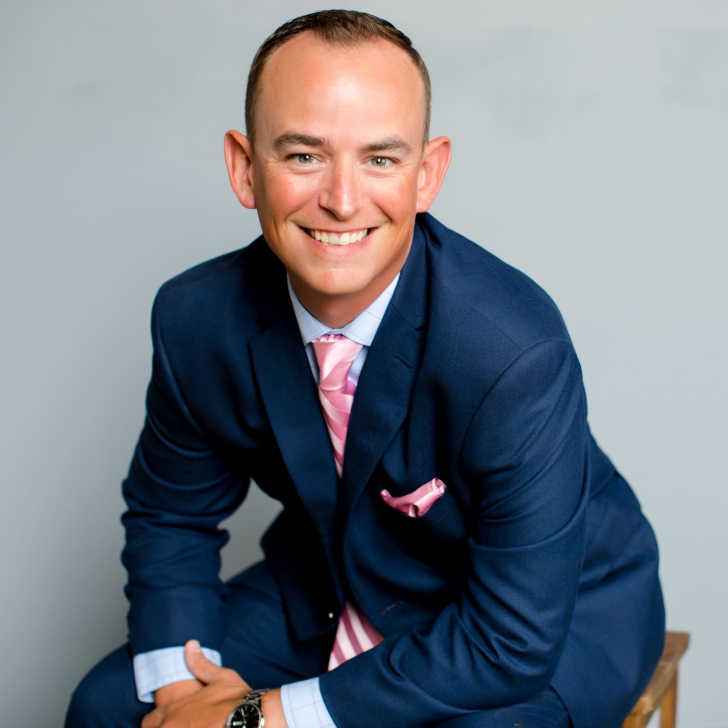
Dr. Scott Richmond is a licensed, board-certified Chiropractor with over 15 years of experience working with patients and clients of all ages. He received his B.A. from Buena Vista University with a degree in Athletic Training. After a baseball season ending injury, the course of his future career was set. Dr.... Read More
- Dr. Scott’s personal experience with Lyme disease and mold Parasites, Heavy Metals, and Detoxing.
- The role of dental health Using frequencies to heal and reset your (autonomic) nervous system.
- Unresolved trauma and emotions.
Related Topics
Chronic IllnessRobby Besner PSc.D.
Hey everybody, it’s Robby Besner and welcome back to another episode in our Lyme series on the “Healthy Hotline.” Today, I have Dr. Scott Richmond. He’s here to help us with some inside tips as to the things he did for himself and the things that he uses in his practice, because he sees a lot of Lyme patients. And more importantly, he’s probably one of the national experts on mold. Dr. Scott is gonna tell us all about it. Give us a little bit of the backdrop as to like how you got to who you are today.
Dr. Scott Richmond
Yeah, we’ll kinda start in the middle. I became a chiropractor after going through undergraduate as an athletic trainer. I had you know, some injuries in college, I went, you know, played a lot of athletics. And that’s a part of really my story is, as growing up the, you know, something changed in grade school and the inability for my body to really recover. But of course I was younger at that time and was able to really just kind of push through, but I knew something was off.
And, you know, like I said, fortunately, I went into chiropractic school and I had started in my office and this would have been 2006. And I started to real go to different seminars and learning more, just all about practice. And I started to hear about toxicity and it really intrigued me ’cause it’s like, if there’s these talks of inside of people’s body and I’m adjusting them through their spine and affecting the nervous system, how are we also getting this stuff out of the body? And, you know, intuitively, which I think is just a God-given gift. I was like, I should pay attention to this topic. And lo and behold, fortunately, a year and a half later, I found myself very, very sick. My daughter had just been born and within a week she also had, a systemic rash, super colicky. And within three and a half months, I knew something was off.
And at that time I was just, I was blessed to be able to remember. I also was starting to hear about biotoxins in 2007 and heavy metals and how all of this is really playing a factor, not only with our body or organ system, our brains. And I found myself in that exact same situation. I lived in a house that was built in 1940 and lo and behold there was water in the basement. And so at least I knew, hey, I think I know what’s going on. And really from there, my entire life story started to unravel. And you know, of course I knew I was dealing with mold. My daughter was dealing with mold.
She developed the mold cough. She had a lot of GI distress. And in the same with myself to the fact where I was actually even you know worse, than what she would react in kind of more of an allergy, where for me, I was very, very sick just due to you know, genetic makeups and the inability to clear this stuff. I found myself hospitalized. Fortunately, I was able to get out after a few days, I had the systemic mold rash myself, and we started to really dig into discovering what’s really going on, and most importantly, how do we get well? And so I looked at my blood. I saw, you know, my daughter was eight months old at the time and you know, she was full of mold too. And I was fortunate that I had people in my life, other doctors, practitioners who have been through similar journeys and that’s where it started for me. And so, you know, just through the years and starting to dig into whether it was other seminars and supplement companies and solutions, it really led me down this path to also understanding that really what we’re talking about today is it was never just the mold.
And so that would kind of be the first, you know, asterisked, if somebody’s dealing with Lyme or co-infections, and you know, you get this exposure from mold. Mold just makes everything else worse, which is why we’re talking about it even though we’re really here to talk about Lyme today.
And that’s what I discovered is sometime in my childhood. And I can remember, I live here in Iowa. I’ve played in the woods and out in the corn fields and did all of that as a young child. And I remember having ticks, I remember having you know, one embedded in my head, you know, really bad. And at that time, yeah you know, just pluck them off or take a match and try to remove them. And it all started adding up because what I discovered is I was dealing with Lyme and I was dealing with Bartonella and also Babesia. So a lot of co-infections, a lot of chronic viral infection. And then as my life progressed on, then came along the mold exposure. Like I said, that was the gasoline on the fire. And that’s really what’s led me to where I’m at today.
I no longer practice chiropractic because about three, four years ago, I was led down the path of really reaching out and helping my local clients and chiropractic patients on this, you know, toxicity issue, heavy metals and gut issues and potentially mold exposures. And it really shine the light that, hey, we need a lot more people that are versed in this area. And so I went completely virtual. So I worked with clients all around the world and doing that online writing protocols and working through it, the entire process. And so over the years, you know, I’ve had ups and downs. Last, so 2012, I was hospitalized for a total of 13 days. I lost 35 pounds in a month. I don’t know about 180 pounds. So if you take off 35, there’s not much left. And that was the last time that I found myself, you know, really crashed and very, very sick. And so it really taught me a lot. And then, you know, as the years have gone on, I think just, you know, really profound clinical nuggets that we’ll you know dive into today and just really starting to relate with this journey. And I kinda resisted working with clients in a coaching standpoint because I yet, I didn’t feel like I owned my own journey yet.
And if you thought some of my words early on just a few minutes ago, I had to point where I look at this as a blessing versus a curse. And that’s when I knew that it was time to shift the act of practice and what I can do to you know really help as many people as possible without having the restrictions of these four walls around me. And it’s been a beautiful transition. I really liked the, you know, the freedom of that, but also taking my journey and looking at some of the missing pieces and how we can really fit what we do into the client’s lives and their journey throughout this. Because as you know, it’s very, very complex.
There’s a lot of ups and downs. But that was one thing is that I had a lot of amazing doctors, a lot of amazing protocols and products, but I didn’t have what I do now with clients. And that’s the support, the guidance when they’re hounded, how do I work through it, and that’s one thing that I think is you know, really special in today’s world. Especially 2020 made us all realize, wow, we can, you know, maybe do some things differently, just like we’re doing right now. You know, you’re on the road and the beautiful place. And here I am and we get, you know, we get a converts and really, you know, help educate people across the world without the confines of an office. And so I’m just super, like I said, super blessed for this journey because it gave me a whole different perspective. And some of the things we learned and some of the challenges and missing pieces that I would have never learned in a school, but even, you know, kind of traditional practice. And so will do that today.
Robby Besner PSc.D.
I guess, they call that the school of hard knocks. So this one, when I grew up. And, you know, that’s such an important thing on many levels, what you’ve talked about. For people that are just tuning in Dr. Scott Richmond, and you can reach him by the way, at thrivehealthcenters.com. And when you go on there, I mean, he’s virtually virtual. So you can go on there, you can make appointments, you can figure out, you know, see his protocols. He’s got an amazing website and an amazing presentation. But, what you’ve said was so important, because first off you drew the mold person, and many of you guys out there, you know, you experience, you know, you may have been diagnosed with Lyme or you’ve had inklings that you’ve had Lyme from things you read in the way that your body is presenting, right. And then all of a sudden says a shift and you don’t quite know why. And all of a sudden it’s dialed up, like the volume in the room went from like a four to a 10. And that could very well be that you got exposed to mold and that inflammatory body response from that extra added toxins, and now another pathogen that’s attacking you, it has really kind of really shifted you. And so you guys have to know this because mold is as an important challenge in our environment these days as Lyme and the various co-infections are by themselves.
And that’s morphing in its own direction as well. And here you are, you know a young man, vibrant, athletic, you know your body, you know, how you perform, but yet you saw that your own health was declining and your ability to recover was declining. And you had the ability, or at least the insight to understand as a young man, there was something wrong and you stayed on that. And then that became sort of the underpinning foundation to who you are today, having that intuitive insight. And also the active listening side of you Scott. I love that about you because when you get a patient, it’s not just that you have your protocols.
You know, and realize that everybody’s body interprets Lyme differently and how you piece together the puzzle of where they are unravel and unpack their symptoms, and then create a manicure protocol that serves that person. Because Lyme is a very individual experience, even though it’s a broad category or a broad diagnosis. So with that, let’s dive into a couple of things that you kinda do that’s different. I know that you’re keen on parasites. You know, there’s a heavy metal influence in your detoxing component of the things that you do when you look at stuff. So once you unpack that a little bit for the people that are coming on to our interview today.
Dr. Scott Richmond
The first thing is you know, when we get the diagnosis or we suspect, you know, Lyme or any of the other co-infections is. We naturally wanna go on this killing spree. You know, we wanna, whether it’s, you know, conventionally through antibiotic or even natural pillars, herbal, you know, types of remedies through the years. And that’s why, you know, the journey was important is because what you know, many, many of my clients, you know, discuss with me when I first have a call with them is how they’ve been so challenged with that approach. And it doesn’t mean that it’s 100% all this time, but what we’ve been able to really figure out is the order matters. And I figured that out, you know, part of ways into my journey, that you know, we really focused on heavy metals because I believe that, that was one of our first biggest insults chemically before we were even born.
I mean, the study show that how many chemicals are found in fetal cord blood, and it’s, I mean, it’s astonishing. And so that sets up this, you know, potential of if you’re exposed to all of these other things, you know, not everybody has Lyme, not everybody’s been exposed to mold, but a lot of my clients have it all. And that’s also me. It’s like, it was the whole gamut. We can work on things to kill the bugs, but let’s actually make ourselves harder to kill, okay. And that’s where the role of parasite and really, really doing parasite cleansing and detox, the way that we do, which was totally different than what I was exposed to years ago. I thought, hey, I’ve already done some you know, things around parasites, and that was it and I moved on. But it took many years, to then look at some of my blood work and sitting in a seminar. I was like, I’m actually been diagnosed medically with what’s called Eosinophilic esophagitis. And somebody is like, well, eosinophils are indicative of parasites and I had a lot of esophageal issues and digestive issues, like many Lyme clients do also along with the mold clients.
And I went, wait a second, if we know that heavy metals weakens the immune system, parasites act like a sponge, we’ve had a tick or even a mosquito exposed, you know, from these infections, it’s the perfect storm. And now comes well, did you move into a moldy apartment? And it just makes everything else worse. And so I started to reverse engineer my own journey to go the orders off. Because the first probably clinical nugget here is when we’re dealing with this, our toxicity burden is, you know tends to be pretty high, but the fatigue, the energy and at the cellular level is low.
So if we try to allow the body to do what it’s designed to do, and yet we’re pushing more detox, like people who have crashed, and that’s why they don’t do as well with the approach of we’ve gotta kill the Lyme, or we gotta detox the mold. And so we actually started looking at it and going, we need to reverse this. Yes, we wanna maybe kinda keep things knocked down, even if it’s with an antibiotic, which, you know, we can talk about kinda when we feel that is the most appropriate approach. But even naturally, we may do some things to kind of keep it at bay, but we’re not trying to ultimately go guns and blazing because that person’s not gonna do well. Ourselves need energy, they need nutrients to then be able to handle that. So we started to approach this differently and building somebody up, working on the gut, the, you know, the first part of your immune system, and then the parasites and addressing this differently with a pretty heavy hand, it was profound in my journey after eight years.
And so I saw that and I went, okay, this makes sense why people were having a hard time detoxing from heavy metals is because they’re being held onto. They’re the big culprit, but we’ve gotta unravel it. And I liked what you said. It’s like, how do we put this all together? Well, that’s something that I took away from chiropractic school, because chiropractic isn’t just, you know, laying my hands on somebody, but it’s also, it’s the principles and the philosophy, but it’s also the art. So now taking this art and how to shift things around, depending on what’s going on and presenting versus, you know, it isn’t a one size fits all, like you mentioned, okay. But what we’ve established and it’s held true for many years now is this order that if you really work with the parasites properly, it helps unlock to then start to clean up the other toxins, which ultimately lead to disease in the first place. Heavy metals, being a big one, glyphosate, other types of environmental chemicals. That then allows your own immune system to better handle Lyme, okay. And then we can actually go through a more of a traditional approach with the different forms that we use when it comes to Lyme or what we now just call advanced immune support.
I don’t even call it a Lyme protocol anymore because probably half the you know individuals don’t even really need to go through the whole entire program anymore because we dealt with the big things that was actually holding our immune system down and it wasn’t so much the Lyme. And this, you know, this has been reiterated by some of the top Lyme doctors in the world. It’s like, Lyme is pretty easy to deal with if you deal with the parasites, but then we gotta do this other cleanup work, okay. So that has held true. And I look back at my own journey. I went, ah! There were clues along the way of why I struggled with heavy metals or why viruses were getting really mad. And now it all makes sense. We have to focus on energy first and then start to peel back the layers. That way, when you do, you know, do some of the herbs or different approaches for Lyme way more effective.
Robby Besner PSc.D.
Wow! That’s so powerful what you just said, because you know, many of the Lyme guys that are listening today, they, you know, they’re feeling yucky. If they’ve had symptoms for many years, they’re sick of being sick, right. And so they get, you know, turned down either through a chat room or someone that they may have heard, you know, friends so forth about a doctor, that’s doing some good work and they go there. And then oftentimes the Lyme literate doctors and, or practitioners that feel like they can add value. They go on the offensive or attack the Lyme, the underlying source per se, or the co-infections. But they’re doing that. It’s sort of went by doing that and not creating a strong foundation. It’s almost like throwing gasoline on a fire. You’re already toxic. You’re already, your body is already compromised.
And now there are sort of going after the source. And if they’re effective at doing that, they’re creating another toxic event on top of minority toxic environment. So why not lower those toxic, you know, thresholds create a strong foundation, bring down your inflammatory markers, you know, work on the rudimentary foundational things for optimal health, not just as a chronic patient that supports your immune system, support your gut health and all that. And then you’re in a much better position to actually start being a little more aggressive as to the finding the underlying source. So I, the order and the way you dose is so critical as to whether you’re gonna get a sort of a mediocre result or get an optimal result. So that is so key. There are so many things that you weave into your protocols that I find very unique.
You’re sensitive to the exotic frequencies out there like electromagnetic fields and how they affect the body. You talk about, you know, the mold piece is so important. Whether you’ve had a good dental profile is really important. And a lot of patients, or a lot of doctors that I know that I really trust. If you’ve got root canals or you have challenges with metals in your mouth and things like that, they actually won’t even start working on you until you have that stuff cleaned up, because it’s almost like the mold environment, or you get a Lyme patient that’s living in a mold house, you try to fix them. But unless you fix the mold piece, they’re being dragged down, almost like there’s a bone chain around their ankle because the mold you’re constantly being reinfected on the mold side, which slows down the progress of your healing on all other levels. So really kind of taking care of cleaning up the house, you know, so to speak in lot of ways is so important to getting the proper result.
Dr. Scott Richmond
That’s part of my job. And you mentioned like even dental health is a lot of the times, you know, we know, you know, some of these big components that people are dealing with. If, you have a pulse, you have parasites. And that contrary to what, you know, modern medicine in the United States, you know, industrialized country, world says, but we know it to be true. And it’s very relative to everybody listening. That’s why it’s such a big part of what we have to address to really be able to handle the deeper detox and the Lyme protocols or cleaning up a mold or whatever it may be.
It’s a big driver because the parasites lock down the immune system. So we don’t have that response they’re like, hey, I’ve never get a cold. Well, you’re supposed to get a cold if you’re actually exposed to something. And that’s fine because it’s building your immune system. But a lot of of chronic ill patients, they notice that they don’t get that. And that’s what parasites are doing. And of course, heavy metals, more inflammatory oxidative stress, and it just wreak havoc on the organ systems. So the other part of really what I look at is being an investigator. There’s some you know key components that I always have in the back of my head. Yes, you know, unknown mode exposure is a big one, okay. EMF exposure, which you mentioned. Dental infections, cavitations is another big one that happened to me.
After about three months into starting to really work on parasites and the way that we do now, all of a sudden my body went, hey, there’s a problem here and I started getting jaw pain. And I knew what it was. Right away I drove two hours one way, did an ultrasound verified it three months later had a cavitation surgery, but I had bone necrosis all the way, you know halfway down my mandible. And, but I never had any symptoms. And it’s typically from where your wisdom teeth are. Well, I was 17, you know. Today I’ll be, or not today, but here in a couple of months, I’ll be 42. So and this was just three years ago. So it had been a long time festering. And that is another big reason why people aren’t getting well is this role of dental health, okay. The other thing that we haven’t mentioned yet is radioactive elements.
Whether it’s from the water, we’ve got a very big radium belt up around the Milwaukee area. So there’s a lot of things in the environment, also from stress. Energetic stress, radioactive element stress that also weakens our system. And, you know, you talk a lot about it because you’re in the world of infrared and frequency. So we, that to me, we would see mitigation, EMF, that type of stuff, or using frequency for healing. I believe is one of the most underutilized tools that we have because our bodies are electric. And so a lot of you know, clients will deal with this. They, don’t have proper nervous system tone. Their vagus nerve is being effective, they’re sympathetic dominant.
And while we can do lifestyle things, meditating, breathing, you know, hot cold showers to really improve all that, applying frequency to help reset the brain and the nervous system, which I’m a chiropractor. I’m not a back doctor, I’m a nervous system doctor. And there’s a big distinguishing factor there. And so now taking that understanding of the human body, bringing it into more of the toxicity realm of things is super important. And so applying those energies to harmonize and to reset, and the calm then allows your oral protocols, or even, you know, your sauna sessions and the ability to detox deeper.
All of that’s only going to exponentially become more effective by allowing your nervous system to be reset. And so I love frequency work, and I’ve always told any client is, you know, while we’re trying to heal, say your liver, your gut, we ought to truly get well and to be optimum. We need to heal the brain, we need to heal the nervous system. And so a lot of these toxins, I mean, even Lyme can be affecting the brain. We know parasites harbor Lyme too, that can be in the brain affecting the nervous system, but also the heavy metals and other chemicals too. And so a lot of times, whether it’s Lyme or mold recombination, we get that you know, brain on fire, brain inflamed hydrocephalus types of symptoms. And so we have to really focus downstream so that we can then drain that brain and calm that nervous system to allow everything else to work the way it’s designed to.
Robby Besner PSc.D.
Wow, wow, wow! So for those just tuning in the autonomic nervous system is broken into your sympathetic and parasympathetic modes. And the sympathetic mode is the one that we’re mostly in these days. In fact, I like to call it sympathetic dominant, which means that you’re anxious, you know people, you know have anxiety and stress. We, have this whole COVID thing going on now that’s dialing that up even more. And, it keeps you at the edge of your seat, like in the animal kingdom fight and flight is when an animal is backed against basically the wall and only has one way to go like attack your heart rates races and things like that.
And weeks in Lyme patients, they experience that through a daily cycle and don’t quite even know why and where it’s coming from, but it is, could be emotional and it could be physical or combination of both. And some of the things you’ve talked about, like breathing techniques, and hot and cold showers and stuff like that, will shift you to that parasympathetic or calm state. And that’s actually a goal. So this is we’re talking physiology, and we’re also talking emotional and the combination of both of those and how it affects you. And so being in a calm state, whatever kinds of protocols you’re gonna do, they’re gonna stick much, much better. That your body’s going to be more akin, to receiving all the other benefits.
It could be nutritional, but if you’re anxious, you’re, it’s gonna slow down the process of your ability to actually potentiate or assimilate those nutrients to rebalance you back out. So I think that this is super important and things that you guys can all do at home and it’s pretty easy. There’s guided meditation, there’s breathing techniques, you know, Dr. Scott, you can reach him at you know, thrivehealthcenters.com, and he can give you helpful tips that will guide you in that direction. He works virtually. And this is such a great advantage these days, because you’re a doctor without walls anymore.
Now you can really reach and touch many people all over the world, not just in your local state, through your clinic. Of course, you always have that ability, but this is really the new medicine as I call it. So we only have a few more minutes today. So, but you’ve really given me so much important things to think about the order of things, the fact that guys like you are out there, that you’ve gone through the journey and that you’re gathering all that information and creating a sort of a protocol and a format and a procedure that is logical and individual at the same time. And yet you brought in things that we never thought about, like cell phones and Bluetooth devices, and how does all of those frequencies affect us, and they do. And your body is like a battery and your body battery needs to be charged.
And we get charged by the earth energy. And so there are positive energies around us, as well as the negative ones. And I love the fact that you have focused on bringing in light energy and sound energy and other kinds of things that are super helpful in bringing back our primal health and that’s super key too. So with a few minutes left, Dr. Scott, are there things we left out? Are there some other pearls that you’d love to share with us today?
Dr. Scott Richmond
Yeah, you just mentioned one of them. So one of those other underlying factors I always have in the back of my head is the emotions. The undealt with traumas, or even perceived traumas, whether it’s childhood, whether it’s adulthood, just, you know, doing this for so many years, we’re all human. We all have stuff. And even if it doesn’t seem like it’s a big thing, it’s our brain has perceived that experience. And so if that’s not being dealt with, you can have the greatest protocol in the world and 100% success rate, but that’s gonna hold you back. And so that’s another one of those underlying things that I always have in my head.
And I always joke with an initial client, I said, mark, my word there’s gonna be some point at a time, usually within this first six months where that shell gets cracked and all of a sudden it starts to open because not everybody’s in that, you know, in that place yet, they’re not ready for that. But somewhere along the journey, I start to hear some clues. And then we kinda start to open that up a little bit more. And, you know, it turns into talking about our experiences and our traumas, and now what are the good resources to help guide through that? Because it takes time.
But like, I always tell any client, it starts with making a decision. It starts with recognizing that, even though you can’t see it today, there are blessings that come over this. My world didn’t change last year, when everybody’s shut down. I still gotta do every single thing, the exact same way that we did. And that was a beautiful thing. And I wouldn’t have ever known that was gonna happen. I don’t think anybody did. So there’s a blessing, you know, my life, my wife, my step-sons and the things that have come out of that, you know, being able to move into our beautiful home after 10 years of living in fear, and that really changed.
And so you also mentioned just, you know, having lived this, that’s another aspect that I hear a lot of when I’m talking with initial, you know, discovery calls, which we do complimentary discovery calls right there on the homepage and click the green button. And that’ll give you access to, so let’s have a short conversation to see where you’re at, see if this is a good fit. If it’s something that I feel confident we can help you with. And that’s what I hear a lot, is I wanna work with somebody that’s been through this and not just here’s the textbook, study practitioner, doctor, you name it.
And that’s the one thing I wanna kind of, you know, end with is the difference between doctoring and coaching or consulting, because that was my experience. I mean, doctors are amazing. They have, you know, their huge hearts, they’re doing everything they can to bring value and to help people you know get their lives back. But what I quickly discovered in my journey is there were gaps and it like, hey, if I’m challenged today, because I’m doing a protocol and all of a sudden something shifted, can’t wait for two weeks.
I can’t wait for three months or even six months, or even you know longer that I get feedback from individuals. And that’s where I was like, the role of what we do, you know, it can be a doctor by licensure. I have a secondary license that allows me to work with anybody ’cause I don’t practice none of my chiropractic license anymore. But now I am able to do all the labs and things like that. But the art of it and what makes it more unique is the accessibility where this is a dynamic thing. If we’re challenged, how do we navigate through it? How do we make sure that you know how to use your tools? Or if there’s new tools, how do we start to implement so that you really know when and how to use them and use them appropriately? Because my number one goal is that you’re not dependent on doctors for the rest of your life. And really looking at the bigger picture and setting up this wellness lifestyle is what I’ve always focused with.
From the day I opened my very first practice to even now working with you know Lyme mold clients and other chronic conditions, but really establishing that foundation so that you can be successful for the long-term not just this crisis. And I think that’s a message that I get feedback that, you know, really resonates with a lot of people and where they’ve been, you know, 15, 20 different practitioners and there’s always missing pieces.
There’s always an order that’s, you know, out of place or it’s a different approach for how do we do, you know different steps of the protocol and that’s what people are looking for. So, you know, if that’s, you, you know, definitely reach out. We’re here to help as many people as we possibly can. And you can have a different experience than what you might have had up to this point. And we, I always say that we have to recover twice. We have to recover from the exposure and we have to recover from the experience. So going back that whole emotional piece is that ultimately, that’s how we heal our mind, our brain and ultimately our body.
Robby Besner PSc.D.
Wow! That was like, the one, two punch right there. And how many of you guys out there on Lyme world have gone from doctor to doctor, to doctor? You’ve had some results. You’ve gone basically into remission for a little bit, then you have a relapse. And so physically, maybe after five doctors in 10 years of trying, you’re basically physically kind of the same, but emotionally you keep making new low’s ’cause it’s hard to try another doctor when you feel like you’re walking into that same experience. And so what you just talked about is so important because in your virtual practice, it’s not just doctoring, but you’re coaching.
You’re actually supporting and creating that bond where the patient does the heavy lifting. We all have to do it. It’s an individual experience. But how many times have you, you know, because it’s, if you’ve gone into the chronic stage, you’ve had it for more than symptoms for more than a year. Then what happens is this that you get, you try things work, but you get impatient because you want it to be like Amazon, where it’s delivered overnight, or the magic pill that you take and automatically, you’re feeling better. This isn’t about that. This is more about the life journey. And what complicates things is the environment we’re living in these days. Because aside from what’s going on on the inside, we’ve got, like you mentioned earlier, glyphosates in the atmosphere and chem trails with aluminum that’s being rained down on us during the day and exogenous frequencies like EMF and ELF and radio frequencies. And all of this together is just beating us up.
And so the idea that you’ve created a platform that allows you to be sensitive to the changes. And so I don’t wanna lose momentum when I’m on one of your protocols, Dr. Scott. I wanna know that if something goes south, I can reach out to you and that you’re gonna be there for me to help me pick me up by my bootstraps and say, okay, we had one little setback, or this is the way your body’s interpreting this boom! This is what we do now. We tweak it this way, bam! We’re back on track.
We haven’t lost the day. And that could make the difference, all the difference in being, getting just a sort of a moderate result, not getting any result or really knocking the leather off the ball. There are people out there that are afraid of Lyme. You know, they don’t really know it’s sorta like, where’s the safe zone and non-safe zone. And we do know that Lyme ticks per se, if that’s, if you have the belief, that’s the only way you get Lyme, which I don’t believe that. I think anything, any vector, any blood bearing insect like a mosquito, you mentioned also earlier, any way you transfer fluid is a possibility of transferring Lyme and or the co-infections, right?
Dr. Scott Richmond
Yup.
Robby Besner PSc.D.
So there’s this fear because you know, now that we’re gonna sort of get outdoors more, the weather’s changing with coming out of winter, there are geocentric areas where we know are there tick infected areas per se, the woods and so forth. Besides just gearing up wearing high socks and being conscious. The other part, like my son, he’s a farmer here in Michigan. He’s out in the field basically every day. So there’s, to say to him, Joe, when you come in from the day, go and run into the shower, just check your body. He has longer hair, check behind your ears, check in your scalp, make sure you didn’t pick up something that you’re not feeling. And that can make the difference in you knowing that you picked up a tick or not. The ticks like to go in to warm and dark and hiding places. So that could be under your armpit or in your crotch or you know, up your leg under your pant leg and so forth or behind your head in your hair. So if I find a tick on me, are there any good ticks out there? What’s your opinion on that one?
Dr. Scott Richmond
No, I’m a big believer of always act as if, and this is the time where, you know, we have a lot of the chronic Lyme. Maybe they’ve been on a next, you know, extended period of time of antibiotic use. And so many of them now are at that point, they’re like, I wanna get off this, but I keep sliding backwards. They struggle with that. And every single case that we’ve dealt with has successfully gotten off antibiotics, which is good, because we know the other detrimental side effects of that really, you know, hurting the mitochondria, the energy levels. But, you know, as far as an acute exposure, I mean, that is really the one time where if somebody was choosing like, hey, I really need to act as if and be as aggressive as I can that I would say, yeah, you know, doing an antibiotic right then and there within 30 days, it would be absolutely .
I can’t give medical advice. But if it were me, that’s exactly, you know, potentially what I would be doing along with everything else I do naturally. So even if you do antibiotic therapy, you can do other things too Ledum palustre, which is you know, a homeopathic tablet. I’ve given it to my dog. You know, you can get some of that. We also do some things topically, whether it’s essential oils or other healing things topically, not the site to just make sure that, you know, there’s no surface level types of infections. And then anything else is gonna be dealing with in the blood and the lymphatic system.
And then of course, you know, really supporting my immune system, whether it’s, you know, making sure I’m getting adequate levels and upping more therapeutically short-term kinda like if you’re taking, you know, a traditional round of antibiotics for, you know, 10, 14 days. I’m gonna take the same approach naturally, which I’m gonna up my vitamin D, I’m gonna get my vitamin C, I’m gonna support my kidneys and my liver, my elimination pathways. And I’m also gonna use a specific binders, whether it’s also gut, but even systemically that way as anything’s dying off, I’m not getting that inflammatory response by all that toxic you know waste from the bug and I’m getting that safely out of my body.
So like I said, I would literally throw the kitchen sink at it. And, you know, if it’s something that’s acute in this case, you know, you’re talking about, you know, being outside and being in the woods as well. I’m gonna be you know, gearing up for our Turkey Season here. And it’s actually, I’m outdoors all the time, but I’ve actually never Turkey hunted. So this is gonna be my first season. And it’s always been, maybe it’s actually been a personal avoidance of mine now that I think about it, it’s spring time, everything’s blooming and the ticks are everywhere. You know, I’m in Iowa. And I mean, there’s ticks in you know, I think in every state.
Yes, there’s certain areas that are gonna be more heavily infected with, you know, Lyme and the strings of align with more infections. But I’m in the same camp of, I don’t believe any of them are truly safe and we should do everything to protect ourselves from clothing, essential oil usage I’m not really worried about a Turkey smelling me like a white tail deer does in the fall. So there’s some other new things that I can do extra to protect, but you know, if something did happen, then I think we have some really good tools and take that approach to do every single thing you possibly know.
Robby Besner PSc.D.
Yeah, you know, when you don’t have Lyme, you don’t know what that experience is, but when you do have Lyme or you’re close to it through your family or a family member friend, then your mind starts to think, well, that could I ever, could that happen to me? Could I be in that state? How would I be? How would my body react to that? And rather than worrying or not, or guessing how that would be. Do you have a very small window in the beginning when you, if you’re lucky enough to catch, you know, the fact that you’ve gotten bitten by a tick and or if you’re lucky enough to see what’s called the classical bull size, bull shaped, bulls-eye shaped rash, which is classical, then you know what’s happening, your body’s responding.
Most of us, most people I know at least 80% have never didn’t even know they were bit by a tick or it happened when they were, you know, very young and then it didn’t catch up to them in terms of symptoms until 10 or 15 years later. So, but if you’re one of those ones that are out there and you can catch it to be proactive, like you said, hit it with both barrels right now, it’s much better to deal with cleanup from an antibiotic, you know, and the imbalance it might create in your biome, in your gut, that that’s much easier to deal with than finding yourself down that rabbit hole of blind challenge, you know.
So that’s super cool. Dr. Richmond, awesome insight. You’re truly an inspiration and you’re not just talk the talk, but you walk the walk. And I think that that is something that’s super real, super authentic. And I wish that every practitioner out there had elements of that in them, in their own practices like you’ve done. So Dr. Scott Richmond, you’re an All-Star. Thank you for your contributions today. Mold expert, Lyme expert. There’s so many more things to talk about, and we hope to have you back on a regular interview. But in terms of this Lyme campaign we’re doing, you’re just, you’re amazing.
Everybody it’s Robby Besner, thanks so much for joining us today. Please share this content with anyone that you think might benefit from it. And we’re looking forward to having you with us tomorrow for another great interview.
Downloads

